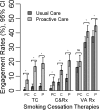Does Motivation Matter? Analysis of a Randomized Trial of Proactive Outreach to VA Smokers
- PMID: 27071399
- PMCID: PMC4945562
- DOI: 10.1007/s11606-016-3687-1
Does Motivation Matter? Analysis of a Randomized Trial of Proactive Outreach to VA Smokers
Abstract
Background: Current guidelines advise providers to assess smokers' readiness to quit, then offer cessation therapies to smokers planning to quit and motivational interventions to smokers not planning to quit.
Objectives: We examined the relationship between baseline stage of change (SOC), treatment utilization, and smoking cessation to determine whether the effect of a proactive smoking cessation intervention was dependent on smokers' level of motivation to quit.
Design: Secondary analysis of a multicenter randomized controlled trial.
Participants: A total of 3006 current smokers, aged 18-80 years, at four Veterans Affairs (VA) medical centers.
Interventions: Proactive care included proactive outreach (mailed invitation followed by telephone outreach), offer of smoking cessation services (telephone or face-to-face), and access to pharmacotherapy. Usual care participants had access to VA smoking cessation services and state telephone quitlines.
Main measures: Baseline SOC measured with Readiness to Quit Ladder, and 6-month prolonged abstinence self-reported at 1 year.
Key results: At baseline, 35.8 % of smokers were in preparation, 38.2 % in contemplation, and 26.0 % in precontemplation. The overall interaction between SOC and treatment arm was not statistically significant (p = 0.30). Among smokers in preparation, 21.1 % of proactive care participants achieved 6-month prolonged abstinence, compared to 13.1 % of usual care participants (OR, 1.8 [95 % CI, 1.2-2.6]). Similarly, proactive care increased abstinence among smokers in contemplation (11.0 % vs. 6.5 %; OR, 1.8 [95 % CI, 1.1-2.8]). Smokers in precontemplation quit smoking at similar rates (5.3 % vs. 5.6 %; OR, 0.9 [95 % CI, 0.5-1.9]). Within each stage, uptake of smoking cessation treatments increased with higher SOC and with proactive care as compared with usual care.
Limitations: Mostly male participants limits generalizability. Randomization was not stratified by SOC.
Conclusions: Proactive care increased treatment uptake compared to usual care across all SOC. Proactive care increased smoking cessation among smokers in preparation and contemplation but not in precontemplation. Proactively offering cessation therapies to smokers at all SOC will increase treatment utilization and population-level smoking cessation.
Trial registration: ClinicalTrials.gov NCT00608426.
Keywords: motivation; smoking cessation; veterans.
Figures

Comment in
-
Capsule Commentary on Danan et al., Does Motivation Matter? Analysis of a Randomized Trial of Proactive Outreach to VA Smokers.J Gen Intern Med. 2016 Aug;31(8):927. doi: 10.1007/s11606-016-3715-1. J Gen Intern Med. 2016. PMID: 27130620 Free PMC article. No abstract available.
References
-
- Centers for Disease Control and Prevention. Quitting smoking among adults—United States 2001–2010. 2011:1513–1519. - PubMed
-
- Centers for Disease Control and Prevention. Current Cigarette Smoking Among Adults—United States, 2005–2013. 2014:1108–1112.
-
- Stead LF, Lancaster T. Combined pharmacotherapy and behavioural interventions for smoking cessation. Cochrane Database Syst Rev. 2012;10 - PubMed
Publication types
MeSH terms
Associated data
Grants and funding
LinkOut - more resources
Full Text Sources
Other Literature Sources
Medical

